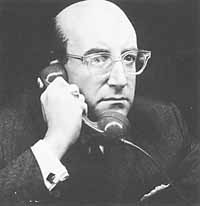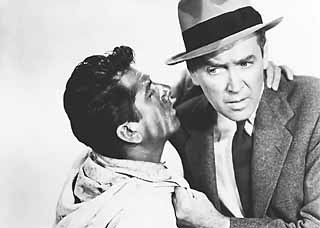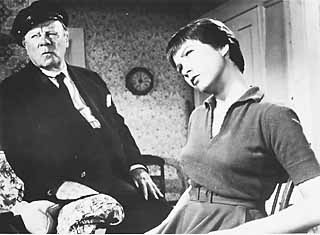Second Coming
Close Encounters of the Third Kind: Definitive Director's Cut (1977)
Fri., July 30, 1999
Before Steven Spielberg became a "serious filmmaker," he made movies like Close Encounters -- artfully enchanting blockbusters which whisked us through worlds of pure imagination. These otherworldly adventures -- which include Raiders of the Lost Ark, E.T., and Poltergeist -- were, at their childlike heart, simple human dramas played out on an intergalactic scale. In Close Encounters, flashing spaceships blaze through Indiana, captivating ordinary working joe Roy Neary (Dreyfuss) and leading him on a desperate mission for the Truth. Misunderstood by his wife and children, the obsessed Neary embarks on a crazy-man's adventure to Wyoming's Devil's Tower, where he and the assembled government (including a scientist played by French director Truffaut) make that all-important encounter of the third kind -- which, for those unschooled, is contact with an alien. But Close Encounters is also about one man's struggle to communicate with the mysterious other -- whether that be aliens, the government, or his frustrated family.
Although the film can be credited with influencing such smart, suspicious genre fare like Chris Carter's The X-Files, it also has the dubious distinction of providing a blueprint for the derring-do of the bloated Independence Day. But unlike much of the science fiction we see these days -- heavy with either paranoia or patriotism -- Close Encounters is far more optimistic about humanity and what twinkles beyond its horizon. The film's end is not ominous, but instead haunting and inviting, the beginning of something entirely new and different, in which its hero, like a modern-day Pinocchio, is swallowed whole in the cavernous belly of the whale (or in this case, the mothership). Though the film was a smash, Spielberg considered the original a mere "work in progress" and has fiddled with the results for decades (on and off). Following the release of a director's cut and a network television version, this fourth 1999 cut reputedly blends the best of both, taking its cue from director's notes. Will it look that different? Doubtful. But can the white shock of light spilling across the screen still hypnotize? Can the most famous five notes in science fiction history still tingle the spine? Can the mystery and intrigue of the beyond still abduct our better senses? I want to believe. (7/30-31, 7:15pm & 10pm) -- Sarah Hepola
THE MAN WHO SHOT LIBERTY VALANCE (1962)
D: John Ford; with James Stewart, John Wayne, Lee Marvin, Edmond O'Brien, Andy Devine.
The last of John Ford's black-and-white Westerns is certainly one of his best. Ford takes halting steps toward making a "revisionist" Western with this film, suffused as it is with moral ambiguities and fine-tuned character performances. Stewart plays an idealistic lawyer who rides to senatorial fame on his reputation as the man who put a bullet in villain Valance (Marvin). Tough cowboy Wayne is the man who bolsters Stewart as he grapples with his conscience in the incident's aftermath. With this film, Ford brought the grand sweep of the Western myth down to the individual and coaxed some great, nuanced performances out of his principals. The film takes its time setting up the showdown between the two men, and by the time it comes around, there's a sweaty-palm level of tension in the scene. Marvin excels as the leathery bad guy; the only flaw in his characterization is that despite the fact that he's so evil, there's something likable about the guy at the same time. Even if you're not a fan of the Western genre, they don't come much better than this one. (8/3, 7:15pm; 8/4, 9:35pm) --Jerry Renshaw
SHAMPOO (1975)
D: Hal Ashby; with Warren Beatty, Julie Christie, Goldie Hawn, Lee Grant, Jack Warden, Carrie Fisher.
Having spent the mid-Seventies learning how to digest solid foods, I've always been mystified by Warren Beatty's reputed sex appeal. His elfin charm having worn thin, Beatty's forays as a Nineties romantic lead (Bulworth, Love Affair) have always struck me as embarrassing. But for those still curious about the allure of this legendary Seventies playboy, Shampoo explains it all for you. Of course, so does Bonnie & Clyde or Reds -- films which reveal the strident, uncompromising thinker at the heart of the vain leading man. But 1975's Shampoo showcases Beatty at his most irresistible, as the philandering hairdresser everyone (but the women he beds) thinks is gay. Of course, not only is he not gay, but he's also Warren Beatty, a horny, charismatic pretty boy who can't say no. From here, it's pure Seventies sex romp, with styles and a social conscience that epitomize the Me Decade. But Shampoo is also a morality tale, a tragedy of indecision about a man who loses everything because of his inability to commit. And ultimately, the film depicts not only the tantalizing free-for-all of the sexual revolution, but also its hollow shell. And it's a film that answers for me, finally, what Madonna saw in the ol' tiger after all. (8/5, 9:25pm; 8/6, 7:20pm) -- Sarah Hepola
DR. STRANGELOVE OR: HOW I LEARNED TO STOP WORRYING AND LOVE THE BOMB (1964)
D: Stanley Kubrick; with Peter Sellers, Peter Sellers, Peter Sellers, George C. Scott, Sterling Heyden, Slim Pickens, James Earl Jones.
For those of us fortunate enough to have lived under the hail of Nuclear Threat, the world is a cagey place. Our eyes are wide open. Forget that the Cold War is "over," our lives are steeped in distrust. Irony makes sense, futures remain bleak, and comedy, my friends, is always dripping black. We know the real story. And for those of you youngsters whose formative years clinked with the fall of the Berlin Wall, for those naifs who think that the Cold War's conclusion makes this world any less of an ominous place to, say, bring puppies and kitties into, get a clue: You are living a lie. No matter what CNN says, the naked truth remains: Good does not exist without evil; for every Mandela, King, or Gandhi, there is a Milosovic, Pol Pot, or Hitler; and behind every sword beaten into plowshare, there lies a Doomsday Device.
|
|
Stanley Kubrick made a career out of waking up and pondering the reason for doing so. He made films about knowing that, while some son of a bitch is, indeed, probably out to rob you of your precious bodily fluids, the notion of actually believing it is pretty damned funny ... or ironic ... or at least, perplexing.
What better time than now, while so many of us are scratching our noggins at his last-ever masterpiece, Eyes Wide Shut, for a posthumous big-screen view of the most overtly humorous and seriously funny of his tragic comedies?
Kubrick's brand of satire in Dr. Strangelove at times borders on, but never quite topples into, farce. The very notion of a world on the brink of nuclear disaster doesn't exactly suggest subtlety. From the side-splittingly sophomoric names of the principals -- President Merkin Muffley (Sellers), General Jack D. Ripper (Heyden), General Buck Turgidson (Scott) -- to the innuendo-soaked phallic shots and references, the film seems doomed to froth over the top. But Kubrick's deft and decisive handling keeps the target locked in. Some of this dead aim is certainly attributable to the film's look -- the rich play of grays against the stark black of the War Room and the industrial grim of the Air Force Base and B-52 interiors lend an air of authority, a kind of twisted documentary feel to the unbelievable but totally thinkable proceedings.
What's most rich about Strangelove, even amidst the rapid-fire script and picture-framed shots, is its characters. Slim Pickens' Major T.J. "King" Kong is the classic dutiful Air Force crew commander. When he spouts, "Well boys, I reckon this is it: nuclear combat, toe-to-toe with the Russkies," the line seems tailored to him. It's no surprise to learn that Kubrick kept Pickens in the dark about the film's absurdist take on global annihilation and directed him to play it straight. Then there's George C. Scott's General Turgidson -- the capable he-man,100% boy, eager to play with the toys in his arsenal -- a role difficult not to interpret as a wild projection of Scott's Patton trademark to come. Of course, it's Sellers who owns the film. His three roles couldn't be more different: the clear-headed and proper RAF Group Capt. Mandrake (the only sane chap in the ensemble); the thoughtful and mild-mannered Adlai Stevenson-esque President Muffley, and the fumblingly sinister ex-Nazi weapons strategist Dr. Strangelove.
Think the lessons offered in this satire don't weather the test of time and sardonic circumstance? See for yourself. This is a rare opportunity to see this classic up on the big board. Don't let it slip under the radar. (8/18, 7:20pm; 8/19, 9:55pm) -- Kate X Messer
SHADOW OF A DOUBT (1943)
D: Alfred Hitchcock; with Teresa Wright, Joseph Cotton, Macdonald Carey, Hume Cronyn.
Don't read a thing about this movie. Don't look it up on the Internet Movie Database. Don't research this choice, just go. Go see Shadow of a Doubt. The first time I saw this movie was with my Dad in our hotel room at a comics convention in Dallas about seven years ago. We missed the opening titles, and we didn't have a clue what we were watching. But from the very first shots, I knew ... This was a Hitchcock film. No, I was wrong. This was one of the greatest Hitchcock films. After it was over, Dad and I argued about whether or not Alfred Hitchcock directed it. Dad believed that Joseph Cotton never made a film with Hitch (in fact he made three). We drove all over Dallas looking for a TV Guide; we had to know who made this movie, what its title was. Was that Hume Cronyn as that ... No, I won't spoil it for ya'.
This is the movie that Hitchcock considered his best film. And you know, putting it side by side with North by Northwest, Strangers on a Train, Notorious, and Rear Window -- it's right up there for me. Listen to Dimitri Tiomkin's fantastic score, the "Merry Widow Waltz"; it deserves its own CD. This is a great one. Do not miss it! (8/23, 9:35pm; 8/24, 7:20pm) -- Harry Knowles
THE MAN WHO KNEW TOO MUCH (1956)
D: Alfred Hitchcock; with James Stewart, Doris Day, Bernard Miles, Brenda de Banzie, Christopher Olsen.
Hitchcock's dazzling The Man Who Knew Too Much all too often takes a back seat to the other films in his Fifties oeuvre, but the film's emotional immediacy and cinematic virtuosity deserve much better. A remake of his 1934 British film of the same name, this swiftly moving thriller about two American parents desperately searching for their kidnapped son while abroad taps into the nightmarish fears of every mother and father, while also featuring some of the maestro's most breathless sequences. James Stewart and Doris Day are smartly cast here; watching their genial screen personas helplessly unravel gives the film its human soul. Seldom has a film featured music as such an integral plot element as here. To prepare his audience for the brilliant scene in London's Albert Hall, in which the clash of the cymbals will cue an assassin, Hitchcock repeatedly plays the critical musical sequence from the cantata "Storm Cloud" beforehand, so that you're tormented with the knowledge of precisely when the bullet will fire. And, of course, there's "Que Sera Sera," sung both as a mother's sweet lullaby and her off-key refrain to alert her missing child. This is moviemaking at its finest. Here's to The Man Who Knew Too Much rightfully getting its due. (8/28-29, 7:15pm) -- Steve Davis
THE TROUBLE WITH HARRY (1956)
D: Alfred Hitchcock; with Shirley MacLaine, John Forsythe, Mildred Natwick, Edmund Gwenn, Jerry Mathers.
Awash in golden leaves and blue skies and crisp sunlight and dead bodies (okay, only one dead body, but it moves around a lot), The Trouble With Harry is one of the lightest of Hitchcock's black comedies. Harry, a troublesome corpse, brings together a beguiling foursome of New Englanders whose aplomb at dealing with murder and its ensuing mayhem is nothing short of hilarious. MacLaine and Gwenn both think they've inadvertently done Harry in; Forsythe and Natwick both see the resulting cover-up as romantic opportunities. Together, they conspire to outwit a dim Yankee sheriff and form an unlikely cohortship in crime. This picture has a fabulous cast -- in her first starring role, MacLaine is a vibrant auburn leaf in the gloriously Technicolor autumn, Gwenn twinkles as a sweetly salty old sea captain, Natwick is radiant as a blushing old maid, and Forsythe is charming as the wry bohemian whose amused calm anchors the group. The Trouble With Harry presents each new outrageous plot twist with over-the-top (under-the-bottom?) New England restraint, and the more understated the characters and the dialogue become, the funnier the picture gets. Fantastic timing, witty dialogue, appealing performances, gorgeous scenery, and a wonderful soundtrack make it no trouble to watch this Hitchcock comedy again and again. (8/30, 7:30pm) -- Hollis Chacona
|
|
GONE WITH THE WIND (1939)
D: Victor Fleming; with Vivien Leigh, Clark Gable, Leslie Howard, Olivia de Havilland, Hattie McDaniel, Butterfly McQueen.
"War, war, war" begins it, and "After all, tomorrow is another day" ends it. Between those two lines lies the masterpiece of American moviemaking. And Gone With the Wind is a movie. It's not a film, not a picture. A big-shouldered, pull-out-all-the-stops, honest-to-God movie. Compared to Scarlett and Rhett, all other lovers pale. Compared to Tara, any other estate is a shanty. And compared to Vivien Leigh and Clark Gable, not to mention Hattie McDaniel and Olivia de Havilland, every other actor is a mere mortal.
When a movie stands as a pinnacle of the form for 60+ years, it's bound to attract some criticism. Racist? You bet. Melodramatic? That's the point. But these arrows are deflected by the sheer grandiose storytelling of a uniquely American moment by a uniquely American art form.
And there's no better place to appreciate the magnitude of the movie than in the grande dame of movie venues, the Paramount. The Paramount's interiors are worthy of Tara's and ensconced in this unabashedly grand theatre, with wine and popcorn in hand, you can fully appreciate this movie that still sets the standard. (9/4, 2:30pm & 7:30pm) -- Barbara Chisholm
THE PARAMOUNT THEATRE SUMMER FILM CLASSICS
7/30-3
Close Encounters (definitive director's cut): 7:15, 10:00
8/1
Superman: 2:00, 4:50, 7:45
8/2
Birdman of Alcatraz: 7:30
8/3
The Man Who Shot Liberty Valance: 7:15
Donovan's Reef: 9:45
8/4
Donovan's Reef: 7:15
The Man Who Shot Liberty Valance: 9:35
8/5
Bob and Carol and Ted and Alice: 7:20
Shampoo: 9:25
8/6
Shampoo: 7:20
Bob and Carol and Ted and Alice: 9:25
8/15
Oklahoma!: 1:30, 4:40, 7:50
8/16
The Lady From Shanghai: 7:20 Gilda: 9:15
8/17
Gilda: 7:20 The Lady From Shanghai: 9:40
8/18
Dr. Strangelove or: How I Learned to Stop Worrying and Love the Bomb: 7:20
The Russians Are Coming! The Russians Are Coming!: 9:20
8/19
The Russians Are Coming! The Russians Are Coming!: 7:20
Dr. Strangelove or: How I Learned to Stop Worrying and Love the Bomb: 9:55
8/20
Psycho: 7:30, 9:45
8/21
Psycho: 5:20, 7:30, 9:40
8/21
There's No Business Like Show Business: 3:00
8/22
Hamlet (Branagh): 2:00, 7:00
8/23
Saboteur: 7:20 Shadow of a Doubt: 9:35
8/24
Shadow of a Doubt: 7:20 Saboteur: 9:35
8/25
Marnie: 7:15 The Birds: 9:45
8/26
The Birds: 7:15 Marnie: 9:35
8/28-29
Shall We Dance: 2:20
8/28-29
Vertigo: 4:40, 9:40 The Man Who Knew Too Much: 7:15
8/30
The Trouble With Harry: 7:30 Rope: 9:20
8/31
Topaz: 7:15 Torn Curtain: 9:45
9/1
Torn Curtain: 7:15 Topaz: 9:45
9/2
Frenzy: 7:20 Family Plot: 9:25
9/3
Family Plot: 7:20 Frenzy: 9:40
9/4
Gone With the Wind: 2:30, 7:30
|
|
Features will be screened at the Paramount Theatre, 713 Congress, although the schedule is subject to change. Most features will be preceded by classic trailers or Warner Bros. cartoons. Adults: $5.50 evenings; $4 before matinees before 6pm; children under 12, students with ID, and seniors 65+ are $4 at all times. Individual tickets are on sale (cash only) the day of the show beginning at noon Mon-Sat, or 30 minutes before the first show on Sun. A FLIX-TIX book of 10 tickets costs $32. FLIX-TIX may be purchased (cash, local check, Mastercard/VISA) in advance any time during regular box office hours, or by calling 472-5470. ($1 service charge is added to the cost of phone orders.) For additional info, call 472-5470 or visit http://www.theparamount.org.









